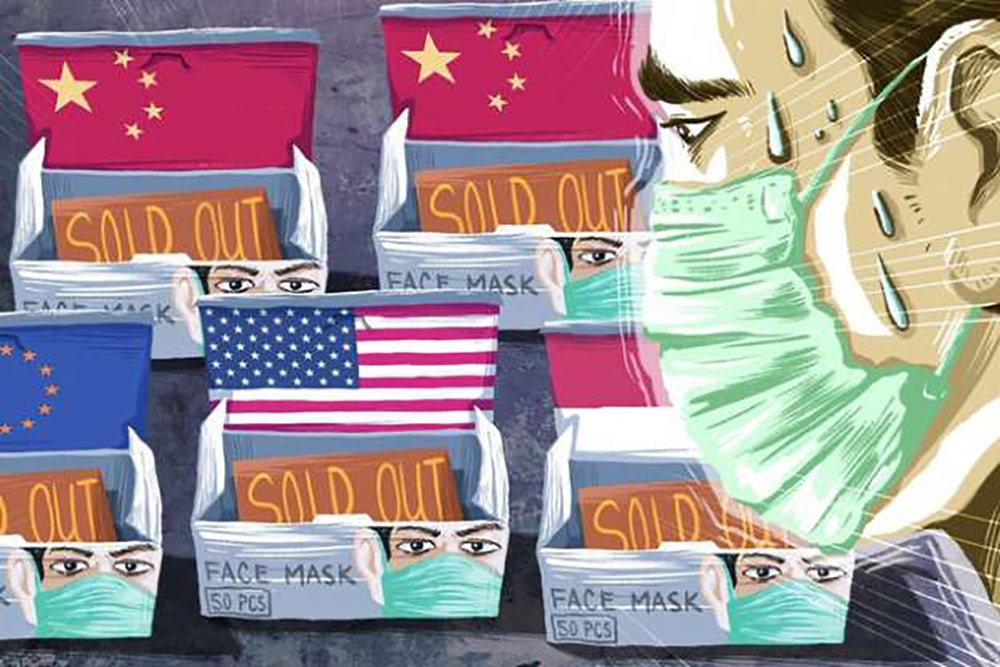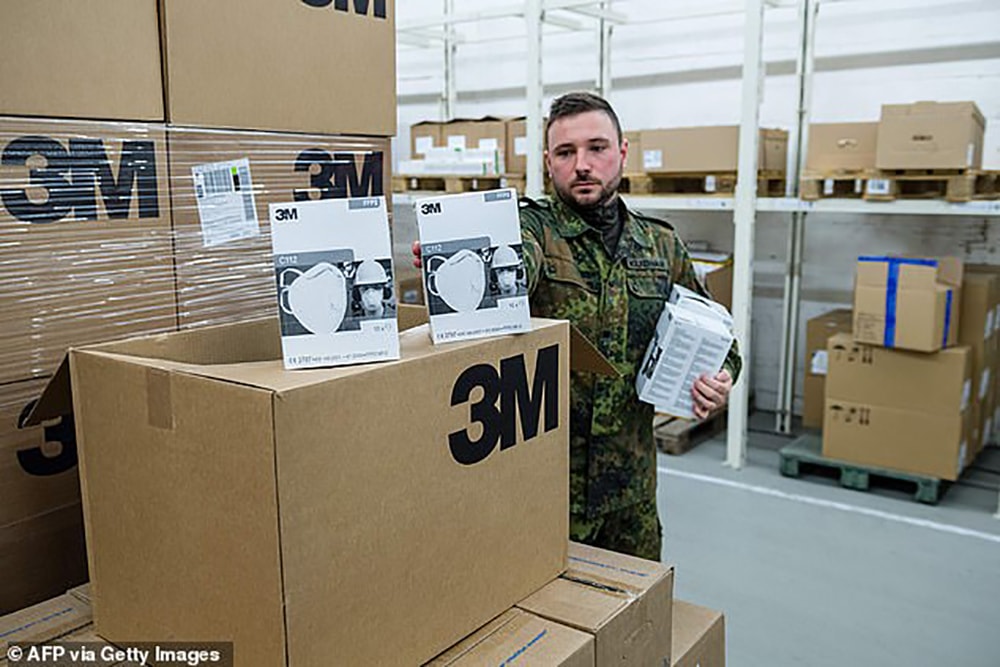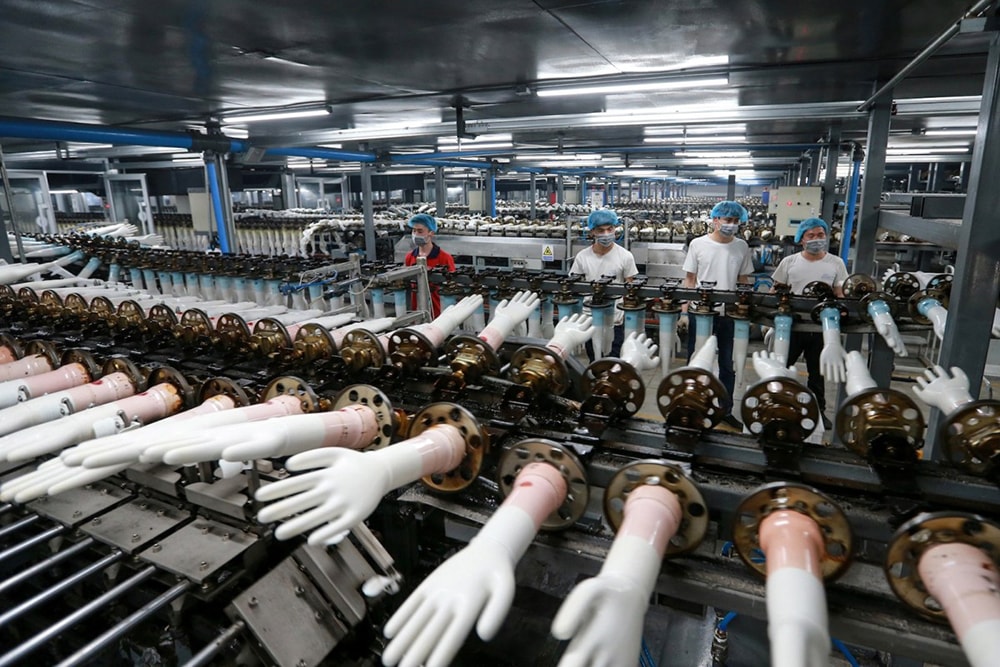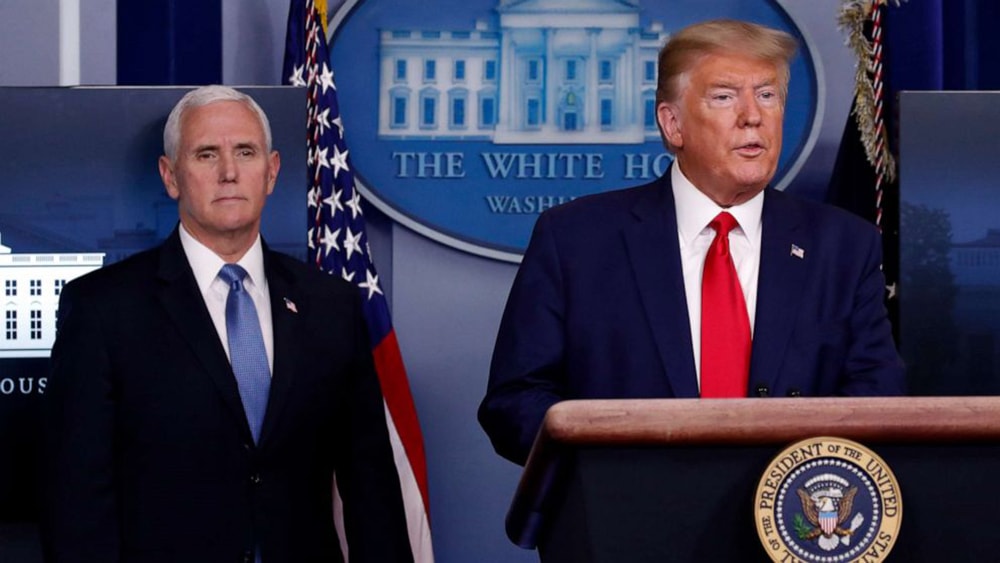Mask War: When Benefits Come First!
(Baonghean) - The world has had more than 1 million people infected with Covid-19, leading to a crisis in medical equipment, leading to a fierce fight for masks, gas masks, gloves... on a global scale, regardless of allied relationships. This not only raises questions about the value of international relations in a crisis but also shows many "gaps" when the world has to cope with the "great earthquake".
The “Dark Side” of Friendship
In recent days, not oil, gold or stocks, but masks and medical equipment have been the most vibrant markets around the world. The change in the "view" of countries from Europe to the US on masks - medical protective equipment during the Covid-19 pandemic is the main reason why this item has become "in demand".
Western societies, which once considered wearing masks as “abnormal”, have now been forced to recognize masks as one of the important measures to help prevent the virus from spreading widely in the community. That is why, in the past week, in addition to special equipment such as ventilators and test kits, the most talked-about item in the US and Europe is masks. Of course, these countries do not have enough reserves and raw materials to produce millions of them every day.
 |
| Demand for masks has surged in recent weeks. Photo: SCMP |
According to statistics, the number of masks in the US by the end of March only met 1% of the country's demand. Similar shortages occurred in many European countries. Therefore, they were forced to turn to Asian markets - which are the main suppliers of masks to the world. However, in the context that China and other Asian countries are also in dire need of masks to deal with the epidemic and at the same time, production capacity has not been able to recover to pre-pandemic levels, clearly, the gap between "demand" and "supply" has become very large.
Scarcity turns purchases into "grab and run" deals, defying market rules.
From there, the transactions became “grabbing” and violated market rules. A typical example is the case of Germany “accusing” the US of “stealing” a shipment of more than 200,000 masks purchased from an American company based in China. Andreas Geisel, head of Berlin’s interior ministry, said that this may be because the US government had banned the export of masks. However, he still asked Washington to comply with international trade rules.
It is unclear whether this incident will further strain relations between the two allies, the US and Germany, but German public opinion and the press have openly expressed their outrage. Many German newspapers have called the US's actions "modern-day piracy" or Washington's behavior "Wild West". After this incident, European media also reported that a number of French officials accused the US of "stealing" a shipment of masks that France had ordered from China in advance by offering a much higher price.
 |
| The shipment of masks was reportedly intercepted at a Thai airport and then diverted to the US. Pictured: Boxes of FFP-2 masks being delivered to the German military. Photo: AFP |
Even within Europe, “unsavory actions” related to masks and medical equipment have been mentioned in the press these days. Romania was criticized for deciding to block several parcels destined for Italy, including 10,000 medical masks, 17,000 face masks, 400 disposable masks, and 45 medical protective suits. The EU was then forced to intervene to avoid diplomatic conflicts. France, it is said, also had an unsavory action when it requisitioned 4 million masks in transit from the Swedish company Mölnlycke. These masks were expected to be delivered to Spain and Italy. In addition, the Tunisian Ministry of Trade also accused Italy of illegally seizing a shipment of disinfectant on its way to Tunisia from China.
All these events show that, “from the Covid-19 pandemic, the “dark corners” in international relations have gradually been revealed. Countries have become chaotic, fear and confusion about the epidemic have caused long-time allies and friends to suddenly turn their backs, ready to “take action” for their own interests.
Increased suspicion
The Covid-19 pandemic shows no signs of slowing down, and the scramble for masks, which the press calls the “mask war,” has further highlighted the fundamental suspicions between the US and Europe and within the countries of the “old continent.” Since the pandemic broke out, the world has witnessed a deep, “every man for himself” division between transatlantic allies and between EU countries. From the lack of cooperation and sharing between European countries in the fight against Covid-19, to the US leaving Europe “unable to react” with its travel ban from Europe to the US since mid-March.
 |
| Workers produce medical gloves at a factory in China. Photo: AFP |
These stories may make many insiders feel "shocked" and disappointed, but that is not surprising at all. In fact, the US-Europe alliance has been "going down" for many years, reflected in aspects from security and economic policies to differences in approaches to common and traditional values. The European Union itself also has many "undercurrents" within the bloc. And this Covid-19 pandemic crisis is considered another "test" for the Washington-Brussel relationship as well as solidarity between countries in the EU.
Covid-19 is emerging as a non-traditional security challenge, which is completely different from the economic crisis or terrorist attacks that the US and Europe have faced and "stood shoulder to shoulder". In other words, when the virus attacks, both the US and European countries are at equal risk and threat, so the choice of self-protection or joint response is a story that has been clearly shown in recent days.
The “mask war” is perhaps just a typical example of the so-called “self-interest above all”.
The current “mask war” between countries is perhaps just a typical example of the so-called “self-interest above all”. In the future, it is difficult to know what will happen when the risks from non-traditional security issues are increasingly unpredictable but have strong impacts. In such a context, it is clear that countries behaving in a “populist” manner will make the international environment more unstable. A European politician had to emphasize that, “if you only maintain an alliance when everything is fine, that relationship has no meaning”.
 |
| US President Donald Trump advised people to wear face coverings because he admitted there were not enough masks. Photo: ABC |
Indeed, in the case of the current pandemic, it is clear that mutual suspicion between countries will hinder joint efforts to confront and address the damage caused by this unknown virus.
On the other hand, the relentless competition between countries, regardless of their close relations, also raises questions about the consequences of over-dependence on external supplies and countries that have not yet been ready for a life-and-death war. According to observers, medical products or other sensitive areas should be considered national security issues. The Covid-19 pandemic is also an opportunity for countries to recognize the "gaps" in the fight against global earthquakes that any country is a victim of./.
